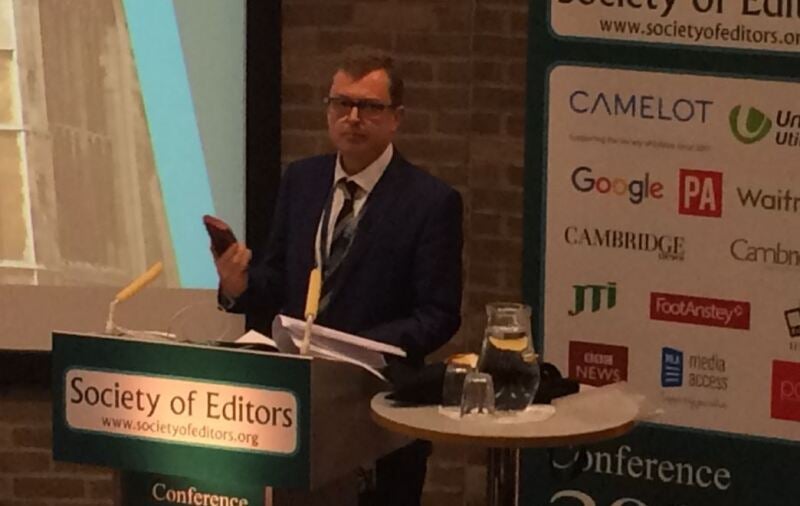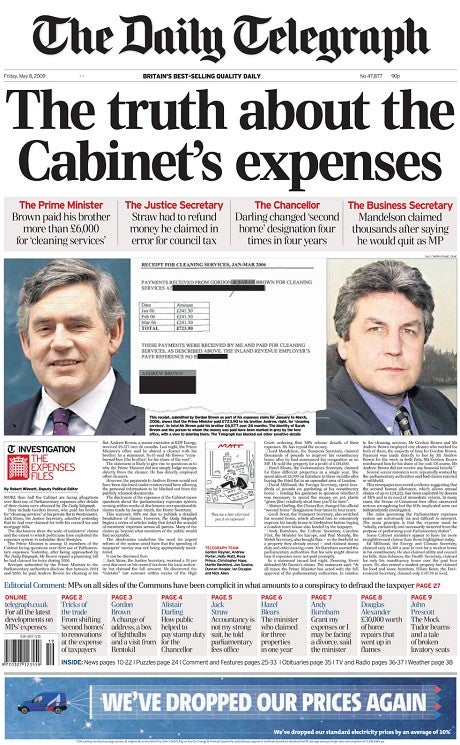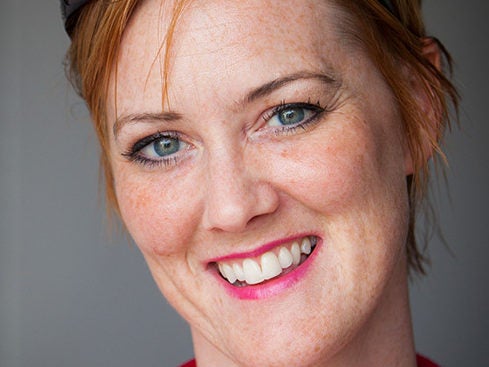
Today marks ten years since the Telegraph published the MPs’ expenses scandal story, which led to parliamentary reform, landed some politicians in jail and secured the paper’s reputation for investigative journalism.
On 8 May 2009, the Daily Telegraph’s splash revealed: “The truth about the Cabinet’s expenses” – the first in a run of exclusives lasting some five weeks which left the rest of Fleet Street playing catch-up.
Five MPs and two peers were jailed in its aftermath, while the entire parliamentary expenses system was overhauled and new watchdog the Independent Parliamentary Standards Authority created.
Matthew Bayley, the Telegraph’s news editor at the time and now assistant editor at the newspaper, remembers how “we were the only story in town”.
“No one has ever published a story that splashed consistently and dominated on one single issue as an exclusive for that length of time ever,” Bayley told Press Gazette, speaking to mark a decade since he helped to plan the famous splash.
“To be at the heart of that story was unprecedented and sensational. It’s never happened before or since.”
The full MPs’ expenses data was contained on a red, external hard disk drive sent to the Telegraph from a source via an intermediary who had called the newsdesk and spoken with reporter Rosa Prince.
The Telegraph is marking the anniversary of its investigation with a 75-minute documentary, The Disk: The Real Story of MPs’ Expenses, telling the behind-the-scenes story on reporting the scandal and featuring the first on-camera interview with the original source of the leak.
The title is also launching a six-part podcast series called Expenses, and new online interactive tools so readers can break down MPs’ current expenses and a game putting them in the shoes of an MP making an expenses claim in 2009.

Telegraph editor Chris Evans, holding the hard disk that was sent in to the newsroom. Picture: Press Gazette
Editor Chris Evans (pictured above) said: “This was a landmark in the history of British journalism which well and truly established The Telegraph’s reputation for investigative reporting.
“The fact that, ten years later, people are still talking about the expenses investigation is testament to the fine work of all those journalists who contributed, including not just dogged reporters but also brilliant sub-editors, leader writers, picture editors, designers, lawyers and many more.”
FOI battle and origins of the disk
The story started five years before the Telegraph scoop was published.
Freelance journalist and FOI campaigner Heather Brooke, Sunday Times reporter Jon Ungoed-Thomas and the Sunday Telegraph’s Ben Leapman separately put in requests to the House of Commons for MPs’ expenses claims in 2005, the same year the Freedom of Information Act came into force.
The legal battle that ensued after the FOI requests were rejected, not once but twice, eventually ended up in the High Court, where a judge backed the journalists.
The Commons was ordered to publish the digitised records of MPs’ expenses claims by autumn 2008, but after efforts began to redact much of the information, a source leaked a hard disk containing some 2m receipts and hawked it around various newspapers using a PR middleman.
Ex-Sun editor Rebekah Brooks later admitted to turning down the story, saying that “in terms of errors of judgment” it was “quite high on my list”. Obtaining the disk, she said, would have “cost quite a lot of money”. The Times said it too was offered the data for £300,000 but turned it down.
The ‘bunker’ and a ‘herculean task’
The Telegraph soon had a team of some ten reporters working on the story with Bayley and then head of news Chris Evans, now the newspaper’s editor, under then-editor Willliam Lewis.
Ninety-nine per cent of the company was unaware of its existence until 10pm on the night before publication, Bayley said.
He added: “I remember we joked to Jon Swaine who’s now with the Guardian in the US, he at the time was a graduate trainee, and we said to him one evening a couple of weeks in: ‘You might as well retire because it’s never going to get better than this.’
“Most of us had been in Fleet Street for quite a number of years by that stage and we said we had never seen anything like this and we never will see anything like this again.”
The reporters were holed up in a “bunker” with no windows, where they were initially brought under the pretence of digital publishing retraining.
Instead, they had the “herculean task” of going through the claims of 646 MPs with an “astonishingly tight turnaround” of just two weeks – the deadline imposed as part of the agreement with the source.
Bayley described how the reporters began to piece together the various issues, including the “low level of excess”, such as using expenses for home renovations, the “actual patterns of abuse”, such as the flipping of second homes for expenses and tax gains and the massive splurge of spending at the end of each financial year, as well as the criminality, such as phantom mortgages.
Asked how long it took to realise the impact of the story, Bayley said: “With any big story you have no idea how big it’s going to be because you can fight in vain, you can plough a lone furrow where no-one pays any attention.”
Bayley said he had to scratch around for stories for the 8 May edition, as the team had yet to decide whether to run what they had uncovered on MPs’ expenses that day. “It was a really slow news day and I was having this terrible time trying to put a news list together,” he said.
“I remember sitting in afternoon conference proposing we splash a story about Joanna Lumley having a fight with the Government about the Gurkhas, but not with much conviction, because in my heart of heart I knew that sitting round the corner we had this extraordinary scoop that we had to make a decision on whether we were going to publish.
“I think we knew that we had found some pretty extraordinary stuff, but these stories have to take off in some fashion.”
‘We knew we were on’
The team gained confidence after then-Justice Secretary Jack Straw responded to one of the right of reply letters sent out by the team to cabinet ministers ahead of publishing and “effectively confirmed everything”.
“That was the point we knew it wasn’t a hoax,” Bayley said.
“We didn’t know how people were going to respond, and the fact that the Justice Secretary, who was quite open about admitting to the mistakes he had made – we knew we were on.”
The Telegraph invited in broadcasters such as the BBC’s Nick Robinson, ITV News’ Tom Bradby and Sky News’ John Craig to preview the story before it published in full the next day and when it ran top of the evening bulletins that night, Bayley said the team thought “wow, okay, that’s a good sign”.
“Then we woke up the next morning to discover it was dominating the bulletins and that others had changed their editions to follow us and we knew what was coming,” he said. “We thought ‘this is going to be great’.”

The Telegraph’s front page on 8 May 2009. The newspaper later accepted it had inaccurately reported that Gordon Brown and his brother had abused the expenses system.
It wasn’t long before some MPs began calling for a police investigation into the leak of the information, but Scotland Yard said it did not think a criminal inquiry would be in the public interest.
‘I would have hated to be in a rival’s shoes’
Throughout this period, Bayley said there was “a real sense of mission and excitement that we were doing something that not only the public were interested in”, but he added: “I would have hated to be in a rival’s shoes at the time having to follow us day after day – you only do that through gritted teeth”.
Ungoed-Thomas at the Sunday Times said he was “annoyed they [The Telegraph] got it”, adding: “It’s always galling when another paper gets the scoop and they got it and full credit to them.
“Also it took quite a lot of good judgment and determination to run that scoop because initially, as you’d expect, there was quite a lot of flak against it and they ran it very well and deservedly got the plaudits for it.”
The Telegraph’s average circulation rose from 774,752 in April 2009 to 836,410 in May when the story broke, staying steady at 835,419 in June before gradually tailing off. It currently sells 342,596 copies a day (ABC figures for March).
At Press Gazette’s British Press Awards in 2010 the Daily Telegraph won six prizes thanks to the story, including newspaper, scoop, campaign and supplement of the year, plus journalist of the year for editor-in-chief William Lewis and political journalist of the year for Robert Winnett’s stewardship of the story.
“For journalism I think it was terrific,” said Bayley.
“I think it was a fantastic piece of public interest journalism and stands as a testament to the power of investigative journalism and actually stands as a pretty exemplary piece of investigative journalism.”
Ungoed-Thomas agreed it was a “victory for the press” and “probably one of the best scoops during my career”. But, he added: “There had been a lot of work beforehand by several newspapers in pushing back against the House of Commons and their reluctance to divulge the full information.”

Heather Brooke, who spent five years fighting for the release of details of MPs’ expenses claims. Picture: Paul Clarke
Former US regional daily reporter Brooke, who also sent in the original FOI request, said she felt her years of work building up to the story had gone uncredited, but added: “I’m not going to begrudge [The Telegraph] because they did great reporting when they had the disk.”
‘Culture of secrecy’ remains
Bayley said that, despite the story leading to a reform of the MPs’ expenses system and an expectation from the public that politicians will be “more transparent about how their money is being spent”, he believed there is still a “culture of secrecy within Parliament”.
“The [Parliamentary] Standards Committee effectively does still feel like MPs judging themselves and they still tend towards secrecy when we had hope that things may become more transparent, so I still think there’s work to be done. But I think overall it was to the public good.”
Part of Brooke’s inspiration to pursue the FOI requests in the first place was her experience being able to instantly access politicians’ receipts in the US in 1992 as a student journalist.
“It did have a big effect I’d say in the first three to five years [since the expenses scandal broke], but now the expenses aren’t available. Even to this day I couldn’t do [in the UK] what I did back in 1992 in Washington State,” she said.
“As a reporter or a citizen I can’t go and instantly find out what my MP is claiming for, claiming taxpayer money on. I can’t look that up.
“It’s still very much a bureaucratically controlled system where the bureaucrats get to know what the public gets to know or not and they control the release time, they control the way that information is disclosed, the format, all that sort of thing.
“There’s been some improvement but definitely more room to improve.”
And Ungoed-Thomas said it’s “getting much better” in the UK, but that “even today many Government departments are really not abiding by the spirit of the Freedom of Information laws and are very slow to respond to requests or give very partial information”.
“[When] the Government operates as transparently as it can then in my view it leads to better and more effective Government and it leads to more effective and better systems in terms of the House of Commons, in terms of expenses and better use of public funds.
“The spending of public funds should always be transparent.”
Email pged@pressgazette.co.uk to point out mistakes, provide story tips or send in a letter for publication on our "Letters Page" blog

